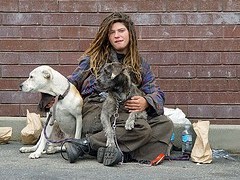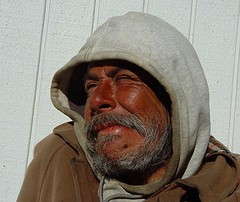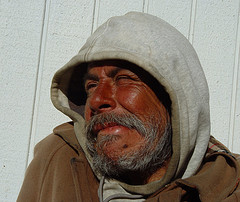 Among the significant number of homeless teens on the street there are many who have been reduced by circumstances to prostitution. It’s a grim and ugly reality.
Among the significant number of homeless teens on the street there are many who have been reduced by circumstances to prostitution. It’s a grim and ugly reality.
One of the factors that makes this issue less visible, in addition to the blind spot many develop towards the homeless in general, is the fact that it does not always adhere to the expectations. The classic stereotype of “hooker and pimp” is only one of many permutations possible on the streets. Prostitution does not always involve an exchange of favors for currency.
Laura Rillos, KVAL News, reports:
[Chris] Mirabal [program manager of Looking Glass New Roads, a day shelter dedicated to homeless youth] said the most common is called ‘survival sex.’ Typically, a person will offer a homeless youth a place to stay and expect sexual activity in return.
Sometimes, said Mirabal, the teen is not aware of the arrangement until after they’ve stayed with a person for a few days or weeks.
This form of predatory behavior is not confined to targeting the female gender. Homeless males find themselves being pushed into these compromising situations as well:
‘They wanted to have, like me have sex with her, while I’m staying on their couch, as part of rent,’ said a young homeless man who wanted to be identified as Brain. ‘I was like, I can’t do that. I’m sorry.’
Brain is 21 years old. He acknowledges his age and gender made it easier for him to say no and leave that situation.
Lack of resources can drive people to desperate measures. Add in the possibility of mental health or substance abuse issues, and the situation gets rapidly worse. When you don’t know where your next meal is coming from it become easier to rationalize things like this.
The escalating harshness of life on the streets over the recent years is also a factor. Young homeless girls in particular are at risk of rape, assault, and descent into prostitution. Without the normal support infrastructure provided by family and friends their vulnerability escalates.
Wendy McElroy, editor of ifeminists and someone who has herself been homeless, has commented on this aspect of the situation back in 2001:
The situation confronting homeless teens is worse today than when I ran away. It was the dead of winter when I left, and for the first nights I slept on the pew of a church whose doors were always open. Today, those doors would probably be locked. I was at one point ‘discovered,’ which was my greatest fear, but the person simply put a blanket over me and left without waking me up. Today, society is numbed to homelessness; we are overwhelmed with compassion fatigue and acts of gratuitous kindness seem to be fewer. We avert our eyes from the hand-painted signs and ignore the rattling cups.
McElroy’s position in the column is a controversial one. She advocates loosening of the child-labor restrictions so that the underage homeless can work and develop their own resources. Her reasoning is that most of the homeless in that age range are fleeing an abusive environment at home, and most programs are geared to return them to that home. Obviously, it is an idea that has gained little traction in the near decade since.
Source: “‘Survival sex’ lures homeless teens into prostitution,” KVAL.com, 02/09/10
Source: “Homelessness and Prostitution,” ifeminists, 05/15/01
Image by Franco Folini, used under its Creative Commons license.
Visit Us on Facebook: Humane Exposures Publishing , downTownUSA, Maggots in My Sweet Potatoes, It’s More Expensive To Do Nothing

 Early morning last Monday had seen faces that you wouldn’t normally see at that hour fan out through downtown San Diego, as the volunteers had attempted to take a census of the society’s disenfranchised. The effort is part of a national initiative to get better data about the homeless population so that help can be given to those most in need. The goal is to reduce the number of homeless on the streets by 100,000 between now and the middle of 2013.
Early morning last Monday had seen faces that you wouldn’t normally see at that hour fan out through downtown San Diego, as the volunteers had attempted to take a census of the society’s disenfranchised. The effort is part of a national initiative to get better data about the homeless population so that help can be given to those most in need. The goal is to reduce the number of homeless on the streets by 100,000 between now and the middle of 2013. As we watch the economy spiral seemingly out of control, the specter of homelessness looms disturbingly close for people of all socioeconomic strata. Add in the chaos in the American housing market, and the picture becomes starkly unpleasant.
As we watch the economy spiral seemingly out of control, the specter of homelessness looms disturbingly close for people of all socioeconomic strata. Add in the chaos in the American housing market, and the picture becomes starkly unpleasant. Childhood experiences can have a lasting impact on emotions, behavior, and experiences later in life.
Childhood experiences can have a lasting impact on emotions, behavior, and experiences later in life.







